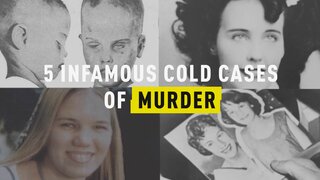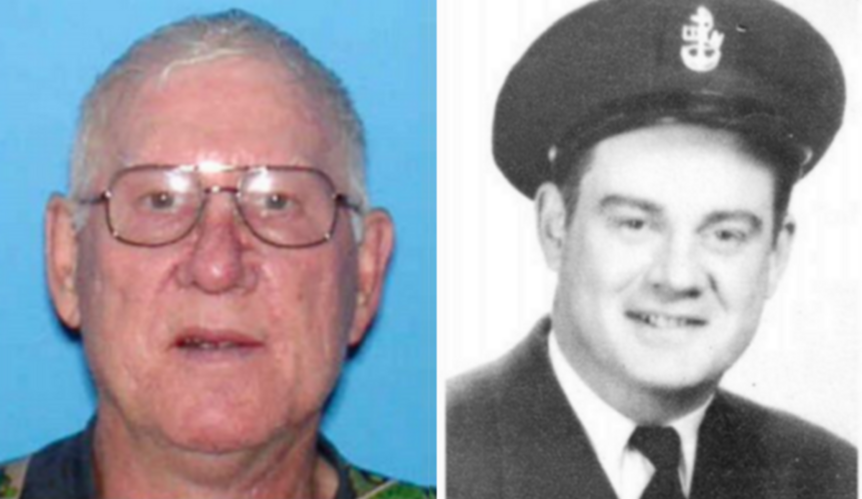Create a free profile to get unlimited access to exclusive videos, breaking news, sweepstakes, and more!
New Hampshire's Oldest Cold Case Cracked More Than 50 Years After Grisly Murder
Everett Delano was shot three times in the head while working a shift at Sanborn’s Garage in Andover, N.H. in 1966. Decades later, career criminal Thomas Cass' fingerprints were tied to the scene of the crime.
Everett Delano, a 49-year-old retired Navy veteran, was working a shift at Sanborn’s Garage in Andover, New Hampshire when a robber entered, shot him three times in the head and made off with around $100. That was in 1966 and over the next five decades, Delano’s murder became the state’s oldest cold case — until last week.
The state’s attorney general on Wednesday released a report regarding the murder of Delano, who was living in Wilmot Flat with his wife and three kids at the time. He died a day after the attack while in hospital.
During the initial investigation, authorities diagramed and photographed the garage, and obtained numerous items for forensic testing, including an extinguished cigarette found next to Delano’s corpse and a hair discovered in the cash register. Additionally, investigators swept the cold-water faucet and soap dispenser in the bathroom for fingerprints since the water was running in the bathroom when Delano was discovered.
After determining that Delano’s death was a homicide, no suspects were identified and no weapon was found in the investigation.
The case was cold until it was reviewed by New Hampshire’s Cold Case Unit in the fall of 2013, when a member of Delano’s family brought the case to its attention. When the state’s CCU ultimately started its analysis, investigators discovered that while fingerprints taken from the bathroom sink at Sanborn’s were mailed to the FBI, they weren’t submitted to the Automated Fingerprint Identification System, which New Hampshire began using in 1998, according to the report.
The fingerprints from the faucet were determined to be those of Thomas Cass, who was 67 years in old in 2013 and living in Orleans, Vermont; no DNA, however, was found in or on the cigarette butt or the hair found in the cash register.
Cass told investigators during a 2013 interview that he committed an armed robbery at a Springfield, Mass. gas station in 1967. His criminal history, however, “included numerous convictions for felonies, including robbery, armed robbery, assault, escape, use of firearms, theft and burglary,” according to the report, as well as many years spent behind bars.
But when asked about the Andover murder, Cass denied having any knowledge of it, adding that he didn’t even know where Andover was located.
In November 2013, Cass provided investigators with a voluntary DNA sample, but refused to submit to a polygraph test. A few months later, on Feb. 20, 2014, CCU investigators interviewed Cass, who had denied ever being in Andover, and told him that they found forensic evidence that linked him to the 1966 murder. They also executed a search warrant in an attempt to find the weapon used, but turned up nothing.
On Feb. 24, authorities received word that Cass committed suicide.
“In her 911 call, [June Spainol, Cass’ live-in companion] reported that Mr. Cass believed that the police were coming to arrest him in relation to a cold case investigation,” the report said.
Later, Spainol told investigators that although Cass denied ever having been in Andover, he said ‘you never talk about something that has no statute of limitations.’”
In a legal analysis at the conclusion of the report, authorities said that Cass’ fingerprints, his “statute of limitations” statement to Spainol and his suicide amounted to admissions of guilt, adding that it’s “a fair inference that he killed himself to avoid going back to prison."
Susan Morrell, the homicide prosecutor who oversees cold case investigations in New Hampshire, told the New Hampshire Union Leader that the delay in handling the case could mostly be attributed to staffing issues, since no prosecutor was expressly assigned to the CCU over the last five years.
However, Morrell applauded the original investigators on the case for their work.
"It is a tribute to the original crime scene detectives that an identifiable latent print was taken from the scene and preserved with the case," she told Oxygen.com in an email on Monday.































